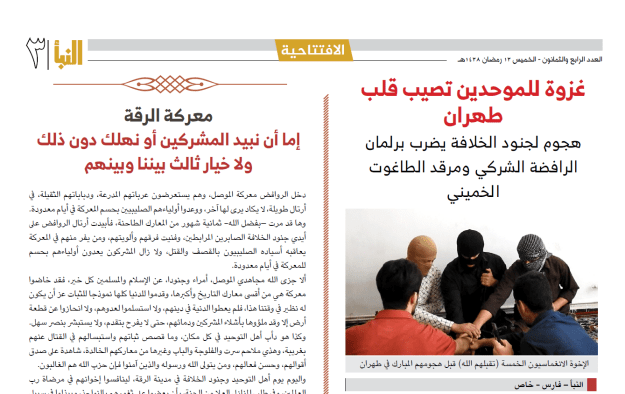By Kyle Orton (@KyleWOrton) on 24 June 2017

Al-Naba 84, page 3
The Islamic State (IS) has a standard strategy of withdrawing from urban areas and conserving its forces when faced with an overwhelming enemy. This strategy has been publicly spelled out by IS, more recently and a decade ago when “the State” was new. The notable exceptions to this rule, Fallujah (2004) and Kobani (2014), were driven by political considerations, and it appears that such considerations apply to Raqqa, IS’s Syrian “capital”, which came under attack from the U.S.-led Coalition’s “partner force”, the PKK front-group that calls itself the Syrian Democratic Forces (SDF), on 6 June. In the 84th edition of IS’s weekly newsletter, Al-Naba, released on 8 June, the main editorial was about the Raqqa battle and encouraged IS’s jihadists to fight to the very last, ostensibly to inflict such heavy casualties over such a protracted period that the SDF/PKK would not be able to sustain itself.
The editorial on page three—where Al-Naba always has its main message—was entitled, “The Battle of Raqqa”, and the subheading was: “Either we exterminate the mushrikeen (polytheists, idolaters) or we perish; there is no third option between us and them”.
The article opens by noting that the battle of Mosul has been ongoing for eight months, a “grinding” fight against the “Rafida” (lit. “rejectionists”; a derogatory term for the Shi’a), intended to refer here to the Iraqi security forces and their allies in the Iranian Islamic Revolutionary Guards Corps (IRGC) who are doing the fighting on the ground, supported by their “Crusader masters” in the air. IS claims to have inflicted heavy casualties on these forces.
“May God not reward the mujahideen of Mosul, the emirs and soldiers, on behalf of Islam and Muslims with all the good, for they fought a battle that is one of the harshest and greatest battles in history, and they presented the whole world with a model of steadfastness”, Al-Naba 84 writes. “They gave their worldly life for their religion, and they did not surrender to their enemy. Not a patch of was parted with until they had filled it with the remains of the mushrikeen and their blood, so that they could not be happy with their progress, nor satisfied by an easy victory.” There were similar “stories of steadfastness” in Fallujah, Sirte, and Al-Bab, says Al-Naba.
“Today is the day of the people of monotheism (ahl al-tawheed) and the soldiers of the caliphate in the city of Raqqa to compete with their brothers to please the Lord of the worlds”, Al-Naba announces.
The believers in Raqqa should hold firm, Al-Naba says, not least because “the apostates come to them with fear and trepidation, knowing with certainty that this battle will not be like the previous battles that they fought with the soldiers of the caliphate”, an oblique reference to the above-mentioned strategy of force-preserving retreats in the face of overwhelming force (something very much on display in the named prior battles Al-Naba celebrated in Fallujah (2016), Sirte, and Al-Bab).
Armies prepare to take losses, even heavy losses, Al-Naba goes on, but “no army in the world can continue in a battle if their losses exceed their ability to replenish [their ranks], and if [the battle’s] duration is longer than their capacity to endure”, giving the example of Iraq, where America left “defeated” and its “prestige at its lowest point” because the continued fighting by the mujahideen dragged the war out to a point it stretched America beyond breaking point.
“The main fear of the Crusaders … is that they know the size of their force well, and they realize that the PKK are few in number”, Al-Naba claims. Even if the PKK were not “poorly trained”, no amount of “expensive weaponry” can make them capable of “bearing a cruel battle like that of Mosul, nor can they bear [with such small numbers] the exorbitant costs that the Rafida incurred in that battle”. [UPDATE: IS expanded on the PKK’s uselessness in urban combat in Al-Naba 97 in October 2017].
Al-Naba concludes: “The duty of every mujahid in the city of Raqqa, regardless of his location, is to bear in mind that this is a battlefield for the extermination of the apostates, a reward for their disbelief in God Almighty and their fight against His religion. This is the final accounting in the long reckoning with them, for there is no end to this battle until one annihilates the other. Either we destroy them … and they lose this world and the hereafter, or we perish … and win the hereafter, the abode of eternity (dar al-khulud). There is no third choice between us and them.”